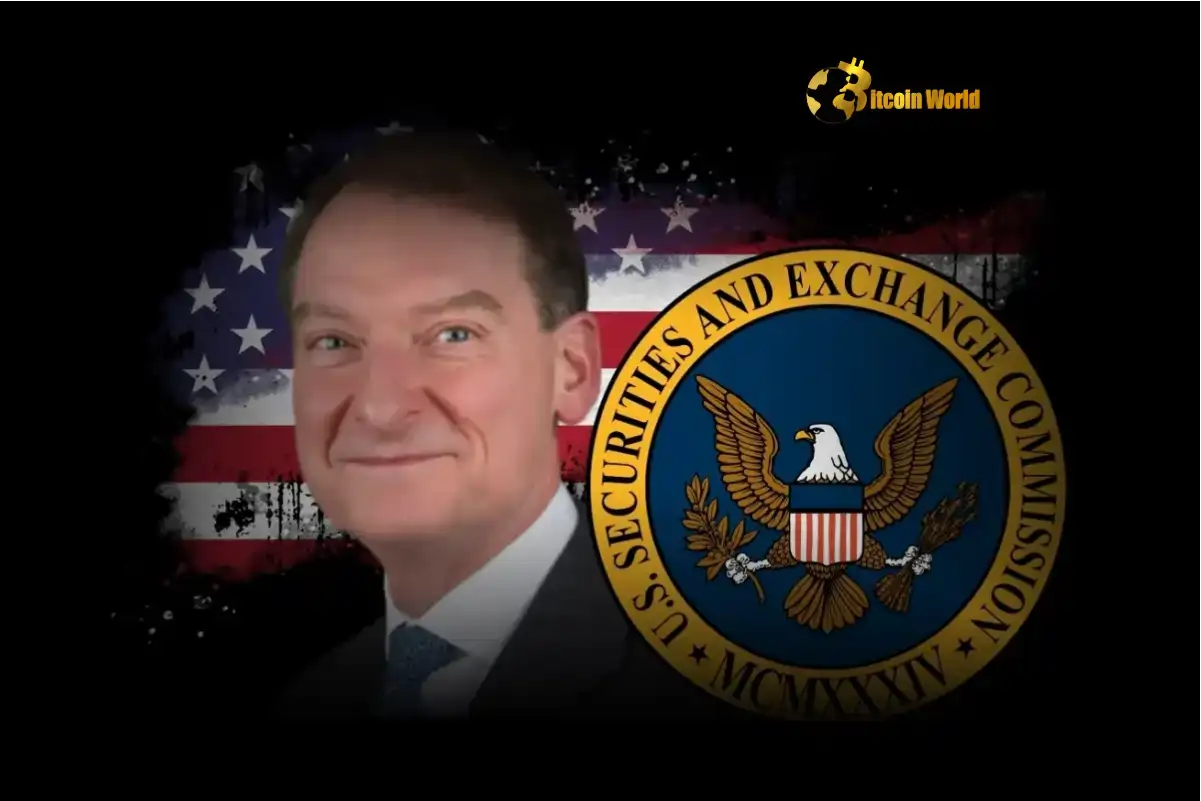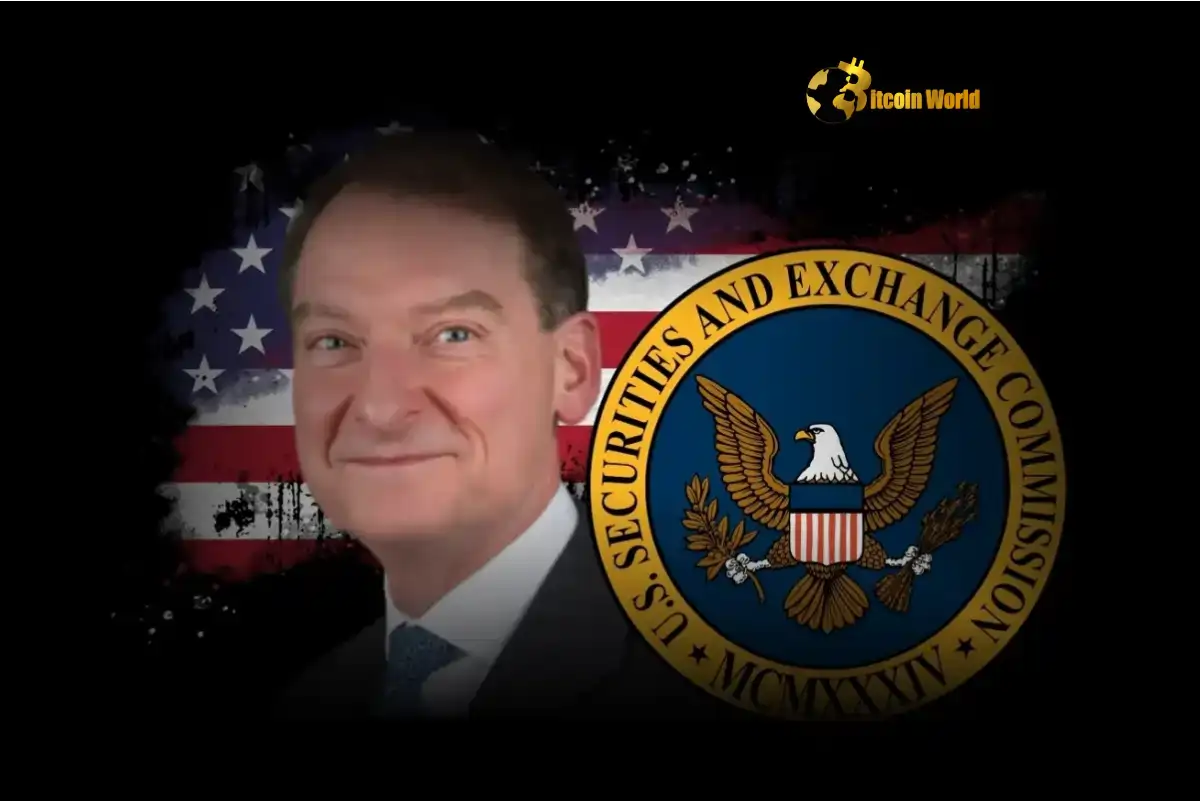BitcoinWorld

SEC Crypto Regulation: A Clearer Era Promised by Chair Atkins
The world of cryptocurrency has long sought clarity from regulators, particularly in the United United States. Recent developments offer a glimpse into a potential shift in how digital assets might be overseen. New U.S. Securities and Exchange Commission (SEC) Chair Paul Atkins recently provided testimony that suggests a move towards a more structured, rule-based approach to SEC crypto regulation. This is a significant point of interest for anyone navigating the complex intersection of finance and technology.
Understanding the Context: Paul Atkins and the SEC
Less than a month into his tenure as Chair of the U.S. SEC, Paul Atkins appeared before the House Appropriations Committee. This appearance is a standard part of the process for agency heads, allowing lawmakers to ask questions about priorities, budget, and ongoing activities. For the crypto industry, Atkins’ testimony was particularly anticipated, offering early insights into his perspective on digital assets and the agency’s strategy under his leadership.
During the hearing, Atkins addressed several high-profile topics, including:
- The status of the SEC’s fraud case against Tron founder Justin Sun.
- The agency’s view on political-themed memecoins, specifically the TRUMP token.
- The broader philosophy guiding the SEC’s approach to regulating the burgeoning crypto market.
His responses provided key signals about the direction the SEC might take regarding US crypto policy moving forward.
What’s Happening with the Tron Case and Memecoins?
One specific point of inquiry involved the SEC’s paused fraud case against Justin Sun, the founder of the Tron network. This case, like many others brought by the SEC against crypto entities, alleges the unregistered offer and sale of securities, among other violations. Atkins confirmed that, despite the pause, the case remains active. This indicates that the SEC is not dropping its scrutiny of individual projects and founders where it believes securities laws have been violated, even as it considers broader regulatory frameworks.
Another interesting topic raised was the TRUMP memecoin. Memecoins are often characterized by their speculative nature and community-driven value, often tied to internet memes or cultural phenomena. The question of whether such tokens fall under the SEC’s jurisdiction as securities has been a point of debate. Atkins reiterated the SEC’s established position that memecoins are generally not classified as securities. This stance, while potentially offering some relief to the memecoin sector, doesn’t preclude potential action based on fraud or manipulation charges under different laws, but it clarifies the SEC’s current view on their fundamental classification.
Shifting Gears: From Enforcement to Rulemaking
Perhaps the most significant takeaway from Chair Atkins’ testimony was his emphasis on a potential shift in the SEC’s regulatory strategy. For years, the crypto industry has criticized the SEC for relying heavily on ‘regulation by enforcement.’ This approach involves bringing legal actions against companies and individuals, effectively setting precedents and clarifying the application of existing securities laws through court cases, rather than issuing specific rules tailored to digital assets.
Atkins highlighted a move away from this enforcement-led approach towards a more transparent and rulemaking-based strategy. He spoke of focusing on establishing a ‘clear and rational framework’ for crypto markets. This suggests the SEC might prioritize developing specific rules for crypto assets, exchanges, and other market participants. This could involve:
- Providing clearer guidelines on how to determine if a digital asset is a security.
- Establishing registration pathways for crypto platforms.
- Setting standards for investor protection in the digital asset space.
Such a shift towards rule-based crypto oversight is something the crypto industry has long advocated for, arguing that it provides necessary certainty and fosters innovation within legal boundaries.
Why is a Rule-Based Approach to Crypto Oversight Important?
A move towards a rule-based framework for crypto oversight offers several potential benefits:
- Increased Clarity: Specific rules provide market participants with a better understanding of their legal obligations and what activities are permissible. This reduces uncertainty and the risk of unknowingly violating securities laws.
- Fostering Innovation: With clear rules, businesses can develop new products and services with greater confidence, knowing the regulatory landscape. This can encourage investment and growth in the sector.
- Enhanced Investor Protection: Well-defined rules can establish specific requirements for disclosures, custody of assets, and market integrity, offering stronger protections for individuals investing in crypto.
- Level Playing Field: Clear rules apply equally to all market participants, creating a more predictable and fair environment compared to relying on the outcomes of individual enforcement actions.
- Global Competitiveness: A clear regulatory framework can make the U.S. a more attractive place for crypto businesses to operate, potentially preventing companies from moving to jurisdictions with more defined rules.
However, implementing a comprehensive rule-based crypto framework is not without its challenges. The rapid evolution of the technology, the diverse nature of digital assets, and the global nature of the market all pose significant hurdles. Crafting rules that are effective, adaptable, and do not stifle innovation is a complex task requiring careful consideration and input from various stakeholders.
Challenges and Considerations for US Crypto Policy
While the prospect of a more defined US crypto policy is welcomed, several challenges lie ahead:
- Defining ‘Security’: Applying the Howey Test (the legal standard for defining an investment contract) to the wide variety of digital assets remains complex. New rules would need to provide more specific guidance.
- Jurisdictional Overlap: Other agencies, like the Commodity Futures Trading Commission (CFTC), also have jurisdiction over aspects of the crypto market (e.g., Bitcoin and Ether are often viewed as commodities). Coordinating efforts and clearly defining roles is crucial.
- Pace of Innovation: The crypto space moves quickly. Regulatory processes are typically slow. Developing rules that can keep pace with technological advancements is a significant challenge.
- International Coordination: Crypto markets are global. Effective regulation requires some level of international cooperation to prevent regulatory arbitrage.
- Political Landscape: Developing and implementing new rules requires political will and consensus, which can be difficult to achieve given differing views on crypto within Congress and regulatory bodies.
Chair Atkins’ stated intention is a positive signal, but the path to a fully developed rule-based crypto framework will require significant effort, collaboration, and time.
What Does This Mean for the Future of SEC Crypto Regulation?
Chair Atkins’ testimony suggests a potential pivot point for SEC crypto regulation. While enforcement actions are unlikely to disappear entirely, especially in cases of clear fraud or manipulation, the focus may shift towards proactive rulemaking. This could involve:
- Issuing proposed rules for public comment.
- Engaging more directly with industry participants and experts.
- Working towards a more harmonized approach with other U.S. regulators.
For crypto projects, investors, and businesses, this potential shift means paying close attention to upcoming rule proposals and participating in the public comment process where possible. It signifies a move from reacting to enforcement actions to potentially shaping the future regulatory environment through engagement with the rulemaking process.
While the journey towards a clear and rational framework for crypto oversight is still ongoing, Chair Atkins’ early statements offer a hopeful sign for an industry craving certainty and a predictable path forward in the United States.
Summary: A Glimpse of Clarity in US Crypto Policy
SEC Chair Paul Atkins’ recent testimony provided valuable insights into the agency’s direction regarding digital assets. By confirming ongoing enforcement efforts like the Tron case while simultaneously emphasizing a move towards a rule-based crypto approach, Atkins signaled a potential evolution in US crypto policy. This shift away from primarily using enforcement actions towards establishing a clearer framework through rulemaking is a development long sought by the industry. While challenges remain in defining, implementing, and adapting regulations to the fast-paced world of crypto, the stated intention to build a ‘clear and rational framework’ offers a promising outlook for the future of SEC crypto regulation and crypto oversight in the United States.
To learn more about the latest crypto market trends, explore our article on key developments shaping US crypto policy institutional adoption.
This post SEC Crypto Regulation: A Clearer Era Promised by Chair Atkins first appeared on BitcoinWorld and is written by Editorial Team





